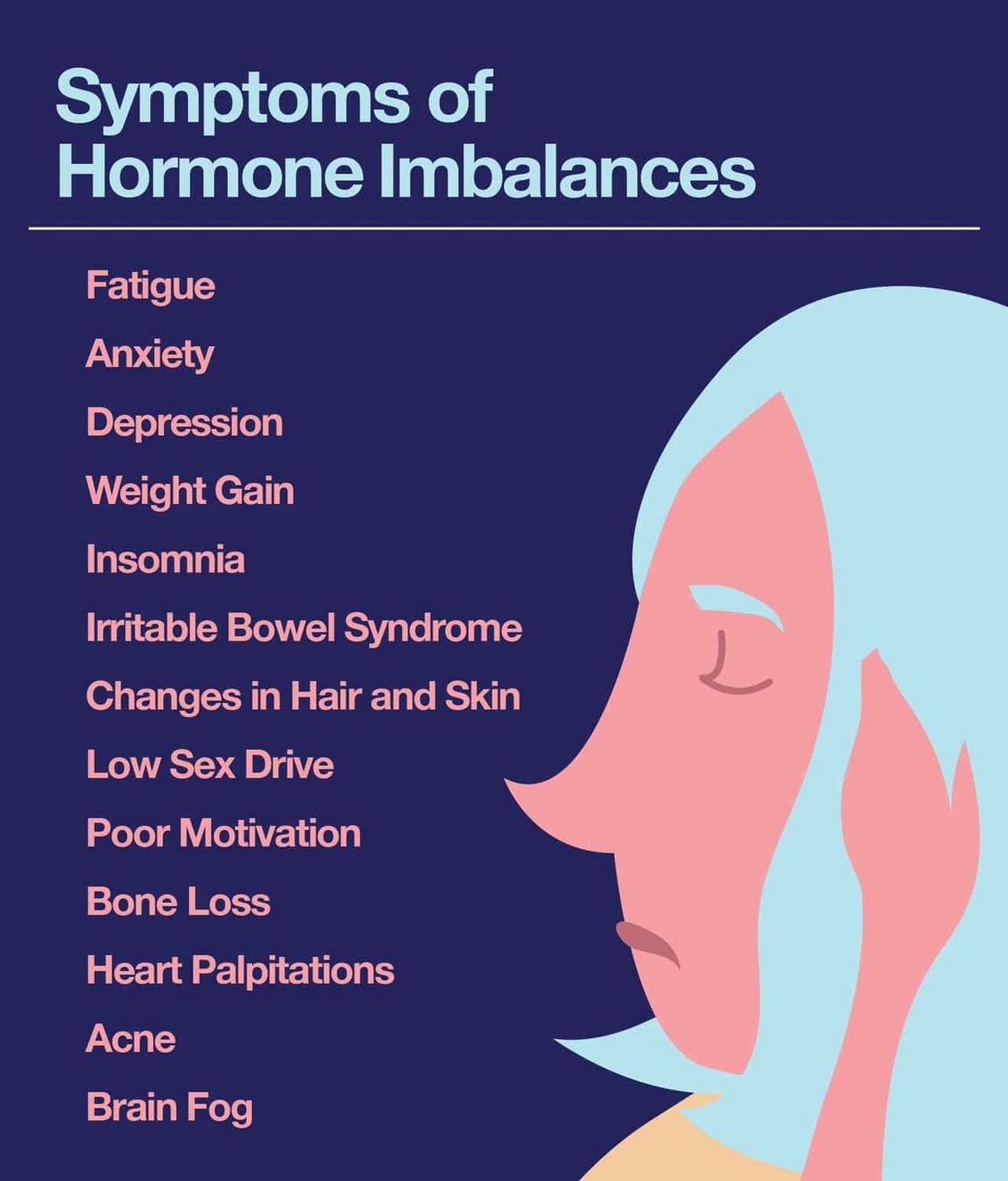
Contents
Causes and Symptoms of Hormonal Imbalances in Women
The main causes of hormonal imbalances are thyroid issues, stress, and eating disorders. Symptoms include irregular periods, low sex-drive, unexplained weight gain, and mood swings.
Hormones, produced by your endocrine system, act as messengers in your body. They regulate major processes and maintain balance. Hormones control energy levels, metabolism, reproduction, and more.
Excessive or insufficient production of hormones leads to imbalances. Even slight imbalances can cause problems like health issues, early menopause, or ovarian cancer. Hormonal imbalances in women have various signs, symptoms, and causes. Finding the cause and diagnosing the imbalance can help restore balance and overall health.
7 signs and symptoms of hormonal imbalances in women
The signs and symptoms of hormonal imbalances depend on the affected glands and imbalanced hormones. These include:
Irregular periods
A hormone imbalance can cause polycystic ovary syndrome (PCOS), where the body produces higher levels of male hormones. This leads to skipped periods and can contribute to heart disease and diabetes. Imbalances can also cause heavier periods.
Low sex drive
Decreased estrogen levels can lead to a loss of sexual desire. Hormonal imbalances can also cause vaginal dryness, making sex painful.
Unexplained weight gain
Low thyroid hormone levels, high cortisol levels, PCOS, and other imbalances can cause weight gain without an obvious cause.
Infertility
Hormonal imbalances can affect the menstrual cycle, making it harder to conceive.
Insomnia
An imbalance in progesterone, known as the "relaxing hormone," can lead to insomnia and chronic fatigue.
Bloating
Hormonal changes can affect digestion, leading to bloating and other stomach issues.
Mood swings
Mood swings can occur due to hormonal changes during the menstrual cycle or menopause. Thyroid hormone imbalances can also cause mood changes.
3 main causes of hormonal imbalances in women
Some causes of hormonal imbalances in women are natural, such as fluctuations during the menstrual cycle, pregnancy, breastfeeding, and menopause. Other causes include:
Thyroid issues
An overactive or underactive thyroid can cause imbalances in thyroid hormone levels. These issues may result from autoimmune conditions, medication, tumors, and more.
Stress
Stress triggers the release of cortisol, which can lead to Cushing syndrome. Prolonged stress affects other hormone levels in the body.
Eating disorders
Conditions like anorexia nervosa can disrupt hormone levels, leading to low estrogen and bone density issues.
Birth control
Some types of birth control contain hormones that can affect hormone levels in the body. They can cause issues like missed periods, irregular periods, heavy bleeding, weight gain, and digestive problems. Coming off hormonal birth control can also temporarily affect natural hormone levels as they rebalance.
Diagnosing hormonal imbalances in women
If you suspect a hormonal imbalance, consult with your doctor for diagnosis and treatment.
Diagnosis typically involves evaluating symptoms and conducting tests, such as blood tests, ultrasound, pelvic exams, x-rays, MRI scans, and biopsies.
Treatments for hormonal imbalances in women
Treatment for hormonal imbalances depends on the cause and may include weight loss, estrogen therapy, hormonal birth control, thyroid medications, and metformin.
How to eliminate hormonal belly fat?
Unexplained weight gain, especially around the waistline, can indicate hormonal imbalance. Hormones play a crucial role in metabolism, appetite, satiety, and energy regulation. To reduce hormonal belly fat:
- Address the underlying hormonal imbalances with medical guidance and lifestyle modifications.
- Reduce caloric intake by avoiding sugars and alcohol to curb unhealthy food cravings.
- Incorporate regular exercise to burn excess belly fat, improve overall health, stamina, bone density, and sleep quality.
By clicking "Submit," I agree to the MedicineNet Terms and Conditions and Privacy Policy. I also agree to receive emails from MedicineNet and I understand that I may opt out of MedicineNet subscriptions at any time.
References:
American Family Physician: "Side Effects of Hormonal Contraceptives."
Gender Medicine. Official Journal of the Partnership for Gender-Specific Medicine at Columbia University: "Do Fluctuations in Ovarian Hormones Affect Gastrointestinal Symptoms in Women with Irritable Bowel Syndrome?"
Hormone Health Network: "Anorexia."
Johns Hopkins Medicine: "Hormones and the Endocrine System."
Mayo Clinic: "Chronic Stress Puts Your Health at Risk."
Mayo Clinic: "Menorrhagia (Heavy Menstrual Bleeding)."
Mayo Clinic: "Low sex drive in women."
National Health Service: "9 medical reasons for putting on weight."
Penn Medicine: "Irregular Periods: Why Is My Period Late?"
Women’s Brain Health Initiative: "The Effects of Hormones on Brain Health."
Yale Medicine: "Women, Are Your Hormones Keeping You Up at Night?"
Harvard Health Publishing: "Abdominal Fat and What to Do About It."
Johns Hopkins Medicine: "8 Ways to Lose Belly Fat and Live a Healthier Life."
Rush University Medical Center: "Losing Belly Fat."
Harvard Health Publishing: "Abdominal Fat and What to Do About It."
Johns Hopkins Medicine: "8 Ways to Lose Belly Fat and Live a Healthier Life."
Rush University Medical Center: "Losing Belly Fat."
Rush University Medical Center: "Losing Belly Fat."


